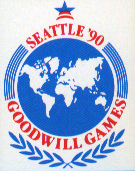Goodwill Games

Logo of the second Games in Seattle
|
|
| First event | Moscow, USSR in 1986 |
|---|---|
| Occur every | 4 years |
| Last event | Brisbane, Australia in 2001 |
| Purpose | Reaction to the political troubles surrounding the Olympic Games of the 1980s |
| Headquarters | Atlanta, Georgia, USA |
The Goodwill Games was an international sports competition created by Ted Turner in reaction to the political troubles surrounding the Olympic Games of the 1980s. In 1979, the invasion of Afghanistan caused the United States and other Western countries to boycott the 1980 Summer Olympics in Moscow, an act reciprocated when the Soviet and other Eastern Bloc countries (with the exception of Romania) boycotted the 1984 Summer Olympics in Los Angeles.
Like the Olympics, the Goodwill Games were held every four years (with the exception of the final Games), and had a summer and winter component. The Summer Goodwill Games occurred five times, between 1986 and 2001, while the Winter Goodwill Games occurred only once, in 2000. They were cancelled by Time Warner, which had bought ownership of them in 1996, due to low television ratings.
The first Games, held in Moscow in 1986, featured 182 events and attracted over 3,000 athletes representing 79 countries. World records were set by Sergey Bubka (pole vault), Jackie Joyner-Kersee (heptathlon), and both the men and women's 200 m cycle racing, by East Germany's Michael Hübner and the Soviet Union's Erika Salumäe, respectively. World records also fell at the 1990 Games in Seattle, to Mike Barrowman in the 200 m breaststroke and Nadezhda Ryashkina in the 10 km walk.
...
Wikipedia
